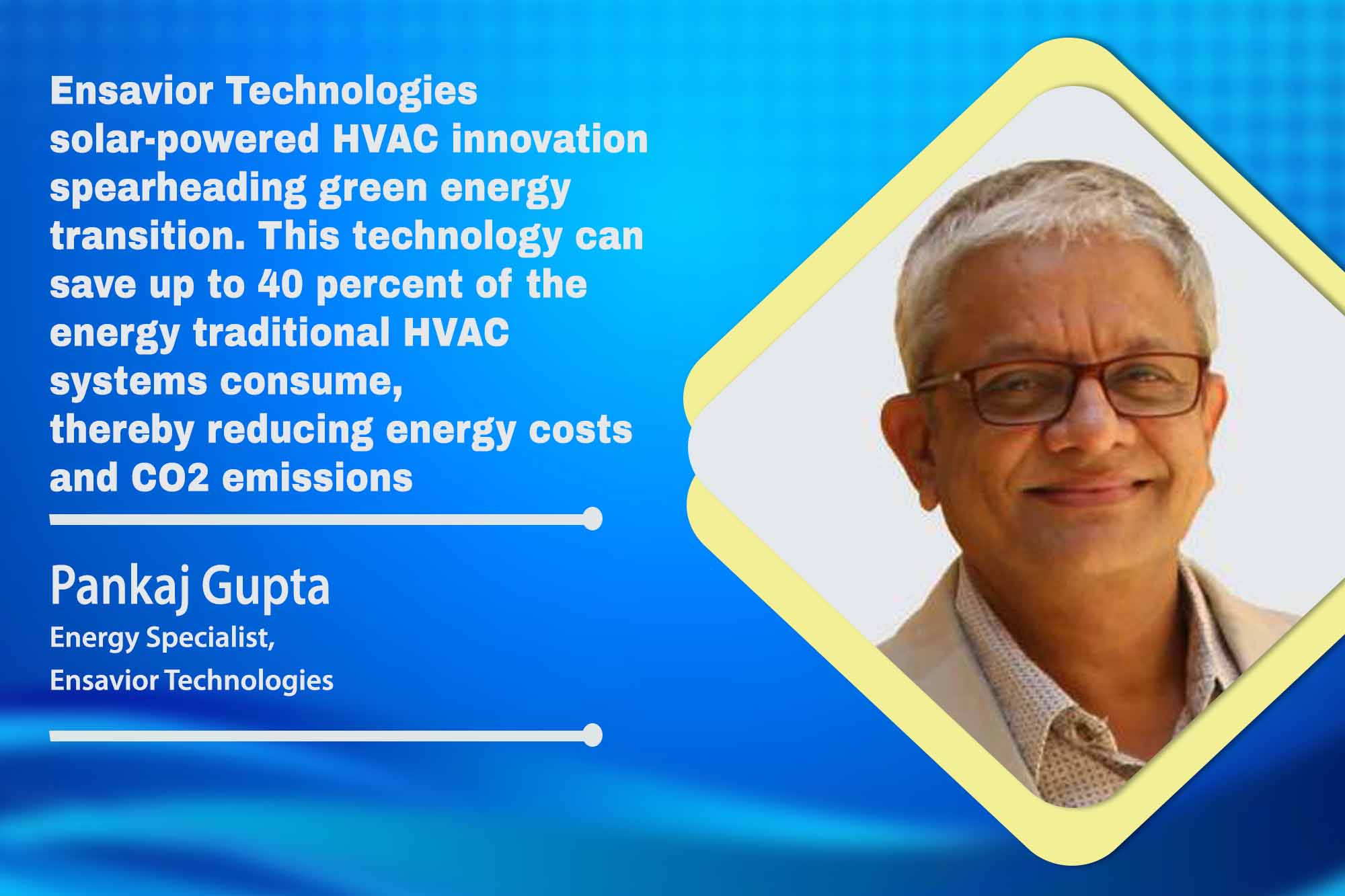The transition from fossil fuels to RE is crucial for climate change mitigation
By EPR Magazine Editorial March 27, 2024 11:34 am IST
By EPR Magazine Editorial March 27, 2024 11:34 am IST

Ensavior Technologies solar-powered HVAC innovation spearheading green energy transition. This technology can save up to 40 percent of the energy traditional HVAC systems consume, thereby reducing energy costs and CO2 emissions.
Innovations in renewable energy integration, such as Savior Technologies’ solar-powered HVAC systems, offer promising solutions for reducing energy consumption and greenhouse gas emissions in the air conditioning industry. However, achieving a sustainable energy transition requires collaboration, innovation, and widespread awareness of the importance of energy efficiency and renewable energy sources. By working together towards common goals, we can pave the way for a cleaner, greener future for future generations. Pankaj Gupta shares his views on the latest trends in the renewable energy landscape with the EPR Magazine.
Renewable energy transition is imperative
The global shift from fossil fuels to renewable energy sources is driven by an urgent need to mitigate the catastrophic impacts of climate change. The primary compelling reason behind this transition is the imperative to limit the increase in global temperature to 1.5 degrees Celsius above pre-industrial levels. Failure to do so would exacerbate the calamities caused by climate change, including extreme weather events, rising sea levels, and biodiversity loss. Reducing greenhouse gas emissions, particularly carbon dioxide (CO2) emitted from burning fossil fuels, and transitioning to renewable energy is essential for achieving this temperature target and safeguarding the planet for future generations. One of the significant contributors to greenhouse gas emissions is the energy-intensive air conditioning and refrigeration industry, which accounts for a substantial portion of global energy consumption, particularly in buildings. As temperatures rise globally, the demand for air conditioning is increasing rapidly, leading to a surge in energy consumption and CO2 emissions. Air conditioning emits millions of tons of CO2 annually, contributing significantly to the climate crisis.
Solar-powered HVAC innovation
To address the challenge of a surge in energy consumption and CO2 emissions, innovative solutions are required to improve energy efficiency and integrate renewable energy sources into heating, ventilation, and air conditioning (HVAC) systems. One such innovation is the integration of solar photovoltaic (PV) panels into HVAC systems, as demonstrated by Savior Technologies. By generating electricity from solar panels and using it to power HVAC systems, this approach reduces reliance on grid electricity generated from fossil fuels and mitigates greenhouse gas emissions. Savior Technologies’ innovation involves the installation of solar panels with solar reflectors inside HVAC systems, allowing for the heating of refrigerants and enabling compressors to run more efficiently. This technology can save up to 40 percent of the energy traditional HVAC systems consume, thereby reducing energy costs and CO2 emissions.Reducing energy consumption
Transitioning towards a service-oriented model, such as “cooling as a service,” offers a promising avenue for reducing energy consumption and dependency on grid power. Under this model, service providers guarantee to meet a building’s cooling demands while ensuring energy consumption does not exceed predetermined levels. By incentivising energy efficiency and performance, this model encourages the adoption of innovative technologies and promotes sustainable practices in the air conditioning industry. However, achieving a sustainable energy transition requires concerted efforts from various stakeholders, including policymakers, industry leaders, and consumers. It is crucial to foster collaboration and innovation across domains to develop and implement effective solutions for reducing energy consumption and greenhouse gas emissions. Furthermore, raising awareness and promoting energy efficiency at the individual, community, and institutional levels are essential for driving meaningful change. Initiatives like presentations and publications aimed at disseminating knowledge about renewable energy and energy-efficient practices play a vital role in this regard, empowering individuals and communities to contribute to the transition towards a sustainable energy future.
Spokesperson: Pankaj Gupta, Energy Specialist- Ensavior Technologies
We use cookies to personalize your experience. By continuing to visit this website you agree to our Terms & Conditions, Privacy Policy and Cookie Policy.